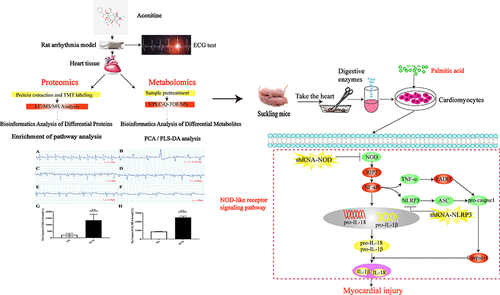当前位置:
X-MOL 学术
›
Chem. Res. Toxicol.
›
论文详情
Our official English website, www.x-mol.net, welcomes your
feedback! (Note: you will need to create a separate account there.)
A Proteomics- and Metabolomics-Based Study Revealed That Disorder of Palmitic Acid Metabolism by Aconitine Induces Cardiac Injury
Chemical Research in Toxicology ( IF 3.7 ) Pub Date : 2020-11-25 , DOI: 10.1021/acs.chemrestox.0c00372 Chenghao Bi 1 , Tianpu Zhang 1 , Yamei Li 1 , Huan Zhao 1 , Pengjie Zhang 1 , Yuming Wang 1 , Yanyan Xu 1 , Kun Gu 1 , Yuechen Liu 1 , Jiao Yu 2 , Wulin Qi 2 , Simiao Fan 1 , Yubo Li 1 , Yanjun Zhang 1
Chemical Research in Toxicology ( IF 3.7 ) Pub Date : 2020-11-25 , DOI: 10.1021/acs.chemrestox.0c00372 Chenghao Bi 1 , Tianpu Zhang 1 , Yamei Li 1 , Huan Zhao 1 , Pengjie Zhang 1 , Yuming Wang 1 , Yanyan Xu 1 , Kun Gu 1 , Yuechen Liu 1 , Jiao Yu 2 , Wulin Qi 2 , Simiao Fan 1 , Yubo Li 1 , Yanjun Zhang 1
Affiliation

|
Currently, research on cardiac injury by aconitine focuses on its effect to directly interfere with the function of cardiac ion channels. Further, abnormal lipid metabolism could cause cardiac injury via inflammatory signaling pathway. In our preliminary study, we discovered that aconitine could alter the metabolism processes of various substances, including palmitic acid. Inspired by these studies, we investigated how elevation of palmitic acid by aconitine causes cardiac injury. Aconitine induced cardiac injury in rats (0.32 mg/kg, d = 7), and the cardiac injury was confirmed by electrocardiogram and serum biochemical study. The proteomic and metabolomic results showed that the palmitic acid level increases in heart tissue, and the NOD-like receptor (NLR) signaling pathway showed a strong effect of cardiac injury. The palmitic acid results in cell viability decline and activates NLR signaling in vitro. The shRNA-mediated knockdown of NLRP3 and NOD1/2 attenuates palmitic acid-induced inhibitory effect on cells and inhibited activation of the NLR signaling pathway. Collectively, this study reveals that aconitine provoked palmitic acid elevation could aggravate cardiac injury via the NLR signaling pathway. This study suggests that drug triggered disorder of the metabolism process could evoke cardiac injury and could propose a new strategy to study drug cardiac injury.
中文翻译:

一项基于蛋白质组学和代谢组学的研究表明乌头碱引起的棕榈酸代谢紊乱会导致心脏损伤
目前,乌头碱对心脏损伤的研究主要集中在其直接干扰心脏离子通道功能的作用。此外,异常的脂质代谢可能通过炎症信号通路引起心脏损伤。在我们的初步研究中,我们发现乌头碱可以改变包括棕榈酸在内的各种物质的代谢过程。受这些研究的启发,我们研究了乌头碱升高棕榈酸是如何导致心脏损伤的。乌头碱诱导大鼠心脏损伤 (0.32 mg/kg, d= 7),经心电图和血清生化研究证实为心脏损伤。蛋白质组学和代谢组学结果表明,心脏组织中棕榈酸水平升高,NOD样受体(NLR)信号通路显示出强烈的心脏损伤作用。棕榈酸导致细胞活力下降并在体外激活 NLR 信号。shRNA 介导的 NLRP3 和 NOD1/2 敲低减弱了棕榈酸诱导的细胞抑制作用并抑制了 NLR 信号通路的激活。总的来说,这项研究表明,乌头碱引起的棕榈酸升高可以通过 NLR 信号通路加重心脏损伤。该研究表明,药物引发的代谢过程障碍可能引起心脏损伤,并可能提出一种研究药物心脏损伤的新策略。
更新日期:2020-12-21
中文翻译:

一项基于蛋白质组学和代谢组学的研究表明乌头碱引起的棕榈酸代谢紊乱会导致心脏损伤
目前,乌头碱对心脏损伤的研究主要集中在其直接干扰心脏离子通道功能的作用。此外,异常的脂质代谢可能通过炎症信号通路引起心脏损伤。在我们的初步研究中,我们发现乌头碱可以改变包括棕榈酸在内的各种物质的代谢过程。受这些研究的启发,我们研究了乌头碱升高棕榈酸是如何导致心脏损伤的。乌头碱诱导大鼠心脏损伤 (0.32 mg/kg, d= 7),经心电图和血清生化研究证实为心脏损伤。蛋白质组学和代谢组学结果表明,心脏组织中棕榈酸水平升高,NOD样受体(NLR)信号通路显示出强烈的心脏损伤作用。棕榈酸导致细胞活力下降并在体外激活 NLR 信号。shRNA 介导的 NLRP3 和 NOD1/2 敲低减弱了棕榈酸诱导的细胞抑制作用并抑制了 NLR 信号通路的激活。总的来说,这项研究表明,乌头碱引起的棕榈酸升高可以通过 NLR 信号通路加重心脏损伤。该研究表明,药物引发的代谢过程障碍可能引起心脏损伤,并可能提出一种研究药物心脏损伤的新策略。











































 京公网安备 11010802027423号
京公网安备 11010802027423号